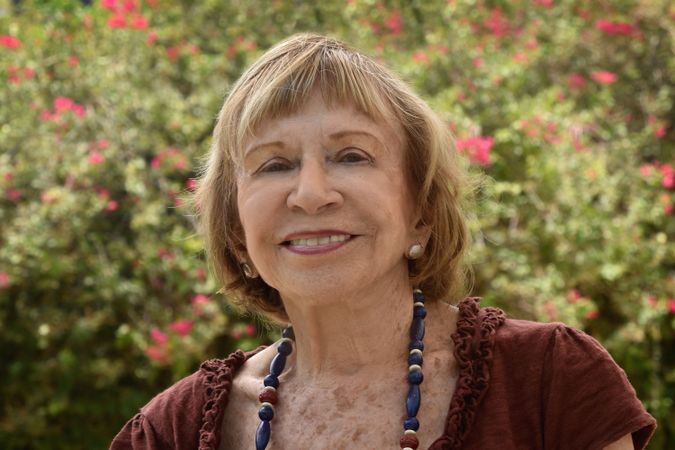16 Over 61: Meet Sonia Pressman Fuentes

Image by Sonia Pressman Fuentes
This profile appears as part of “16 Over 61,” a collaboration between the Forward and the Marlene Meyerson JCC Manhattan’s Wechsler Center for Modern Aging.
Sonia Pressman Fuentes, 92, is the kind of feminist hero people make movies about.

Image by Sonia Pressman Fuentes
She became a leader of the second-wave feminist movement after coming to the U.S. as a child refugee from the Holocaust. She the co-founded the National Organization for Women alongside Betty Friedan. She was the first female attorney to work in the office of the General Counsel at the Equal Employment Opportunity Commission. In her work with the EEOC, she made major strides in reducing the discriminatory practices women faced in the workplace.
And that’s just the start of what she accomplished in a path-breaking career.
In her later years, Fuentes, a member of the inaugural cohort of “16 Over 61” honorees, has continued her advocacy for women’s rights, as well as for Holocaust remembrance. Both are fights in line with the values that she’s come to prioritize: “Human relationships,” she writes, “are the most important thing in life.”
Describe your ideal birthday celebration.
Two years ago, for my 90th birthday party, I arranged for a luncheon at Aviva, the senior Jewish residence where I live in Sarasota, Fla. I invited people I like — both friends and family — and one friend took movies of the event, unbeknownst to me. That was an ideal birthday celebration.
You wake up on a beautiful Sunday morning with an unplanned day ahead of you, and no responsibilities. How do you choose to spend it?

The Marlene Meyerson JCC Manhattan and the Forward present 16 over 61. Courtesy of Marlene Meyerson JCC Manhattan and The Forward
I would spend it as I spend any other day: reading and writing at the computer; wearing my comfortable nightgown and slippers; watching movies and programs on my TV and Zoom; sending articles of interest to my worldwide feminist email list, along with information on my own experiences and thoughts; and reading my current book.
What’s your earliest Jewish memory?
My mother’s kosher cooking.
What’s one thing you absolutely cannot live without?
I can’t decide between my computer and good health. Take your choice.
How do you feel you’ve changed over the years? What ideas have been most meaningful to you as you’ve traveled through life?
Over the years, I’ve learned that human relationships are the most important thing in life. Women’s rights is the most meaningful idea to me since I became involved in it in 1963.
Has your Judaism informed how you approach the process of aging? If so, how?
Judaism is in my bones. It is as integral to me as being a woman. I feel so lucky to belong to this people. It informs my aging as it informs everything else I do. I happen to be a Holocaust survivor, so you can see what being Jewish means to me.
What does the idea of honoring and celebrating aging mean to you?
Most people fear and hate aging and dying, which is the end of aging. Therefore, for an organization to honor and celebrate aging is a wonderful, creative idea.
A message from our Publisher & CEO Rachel Fishman Feddersen

I hope you appreciated this article. Before you go, I’d like to ask you to please support the Forward’s award-winning, nonprofit journalism so that we can be prepared for whatever news 2025 brings.
At a time when other newsrooms are closing or cutting back, the Forward has removed its paywall and invested additional resources to report on the ground from Israel and around the U.S. on the impact of the war, rising antisemitism and polarized discourse.
Readers like you make it all possible. Support our work by becoming a Forward Member and connect with our journalism and your community.
— Rachel Fishman Feddersen, Publisher and CEO























